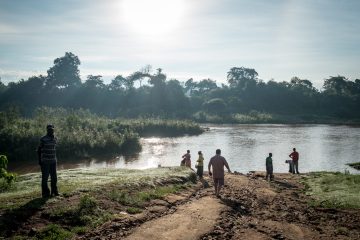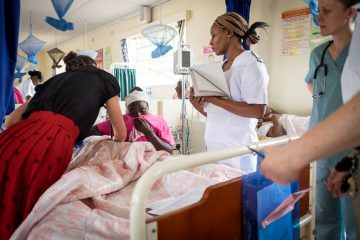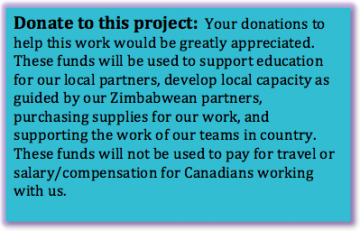Description
 Within the Canadian health care system there is an increasing awareness of the importance of generalism in rural practice, and furthermore the rural generalist’s unique needs from an educational and skills enhancement perspective. Some of these needs may be best met by being exposed to and participating in medical care in the developing world.
Within the Canadian health care system there is an increasing awareness of the importance of generalism in rural practice, and furthermore the rural generalist’s unique needs from an educational and skills enhancement perspective. Some of these needs may be best met by being exposed to and participating in medical care in the developing world.
There are great opportunities for bidirectional learning between communities of practice in Canada and Zimbabwe. On the Zimbabwean side we have engagement with the Government (Ministry of Health and Foreign office), Medical Schools (UZ and NUST) and community partners working on social determinants of health. On the Canadian side there is increasing recognition of the value of generalism to the system as a whole here coupled with a significant proportion of physicians (>50% of rural physicians in BC) being International Medical Graduates.
Our intent is capacity building in both healthcare systems through the development of relationships and bidirectional learning opportunities leading to partnerships. Capacity building for this group has been presented to the group though 3 lenses, direct capacity building (as an individual e.g. skills transfer), contextual capacity building (supporting the team to do so e.g. input to health education), and longitudinal (laying the foundation for future groups, e.g. needs assessment).
 Elective placement
Elective placement
- Karanda Mission Hospital
- Sibongole’s Community Health Project in Cooperation
- Centre for Total Transformation (CTT)
- Rujeko Polyclinic
- St Michael’s Mission Hospital
- Mount Saint Mary’s Mission Hospital
Application guidelines
- When are the placements?

- Elective placements are usually available between Feb/April of every year. Current elective placements are available in Spring 2023. There are also placements in the fall and the potential for summer placements if there is enough interest. The program is somewhat flexible so please email Dr Ray Markham if you have any questions: ray.markham@ubc.ca
- Who should apply? The placement is ideal for students in their clinical training period (UBC MED 4, Residents).
- How long is the placement? 4 Weeks
- What are the estimated costs?
- Travel: Around $1800 for flights, $40US a day for meals transportation and accommodation
- Professional Fees: Physician licensing is $120US
- Student Registration: University in Zimbabwe is $350US, licensing is $30US
- How do I apply? Please send a CV and cover letter to Dr Ray Markham (ray.markham@ubc.ca) expressing your interest. Attendance in online group pre-departure sessions is required.
Voices from past volunteer students, residents, and physicians
2022 Updates! Read and learn more about the ZimCan Health Society through Ray and Alison Markham's blog posts (along with amazing pictures) for their spring 2022 trip: https://zimcan.org/2021/02/24/february-24-2022-blog/
Dr. Bret Batchelor, Enhanced Surgical Skills (ESS) GP, recently visited Karanda Mission Hospital in rural Zimbabwe and had the opportunity to interview Dr. Paul Thistle, a Canadian OB/GYN who has worked in Zimbabwe for the past 26 years. Listen to the podcast at http://podcast.rccbc.ca/2017/03/30/episode-28-march-28-2017/
“Over the course of my global health elective in Zimbabwe, I was exposed to many medical educational opportunities that are much less prevalent in Canada, particularly with respect to diagnosis and treatment of infectious diseases and learning about the natural history of various diseases when patients presented with advanced illness. The importance of addressing the social determinants of health was also clearly demonstrated and I am grateful for all of the resources and governmental support we have available for health care in Canada. I also feel lucky to have had the opportunity to experience such a beautiful country and interact with and learn from the locals and the entire Zim-Can-Health team” 2016 medical student
“It is hard to imagine a better opportunity for medical students and residents to learn first had the importance of the social determinants influence health and the impact that global climate change has on health. We saw patients with cholera because dirty water was the only option to no water, children starving because of drought and famine related to climate change, and women dying from AIDS because, with no other economic opportunities, selling their bodies was the only way for them to eat. These lessons are not only relevant for low-income countries. They are transferable underserved communities in Canada such as inner city, rural/remote, and aboriginal health. Furthermore, our strengthened understanding of these important issues will help us be better advocates for our patients and communities at large” 2016 resident
“I think this was a really important experience as I gained a perspective of what life is like in Zimbabwe first hand from a Zim native. I got to ask so many questions and learn about the history and current issues in the country. They taught me about their culture, food and activities. It was amazing” – UBC Medical Student
“I couldn’t have asked for a better clinical experience at Karanda. Due to the unfortunate circumstances of healthcare, I witnessed stark differences between first and third world medicine that I will remember forever. Diseases like HIV, TB, and malaria were ubiquitous and seeing the consequences of inadequate or improper treatment and their complications was both frightening and extremely worthwhile. At times I was given tremendous responsibility in the assessment and care for these patients, and I recognize the value of these experiences to move forward confidently as a new physician” – UBC Medical Student
“The variety of encounters with the Zimbabwean health care system gave me a full scope of perspectives and helped me better understand the strengths and challenges. I am interested in public health and health care systems - this experience gave me a very interesting picture and something that I wasn't expecting. Working and meeting with a variety of health care providers across health care centres from community health providers, nurses, midwives, physicians at community to regional to tertiary care centres - gave me a perspective that was well rounded. Seeing how medical students are trained, what the resources are available was also part of this overall picture. Altogether, this has shown me the complexities of the health care system and allowed me to compare to Canada, inspiring me to continue looking at health care systems and where I can be involved in change in the future” – UBC Medical Student
“I think the mix of both community and hospital is very valuable as a med student and I would encourage students to do both. Yes, the hospital stuff certainly puts us out of our comfort zones, but personally I think that is often where the best learning occurs” – UBC Medical Student
2015 Group Trip Blog - https://www.tumblr.com/blog/zimcanmed2015
Photo gallery
All photos by Robert Shear.